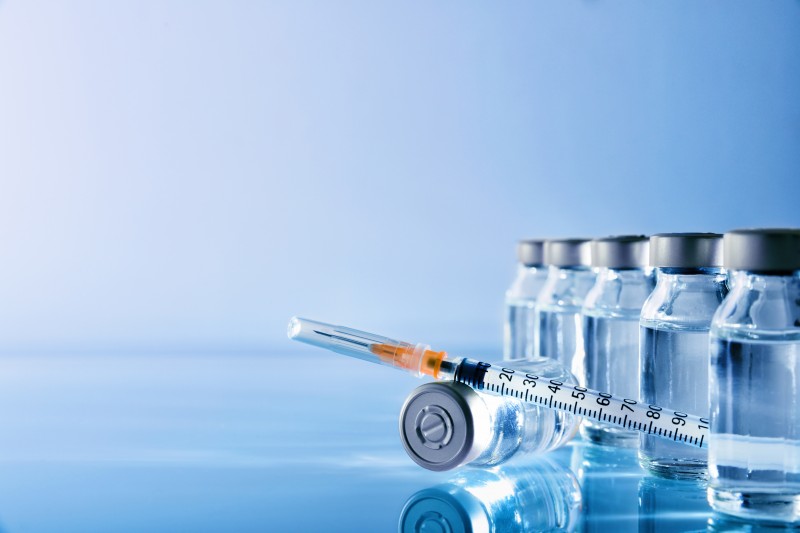
As a scientist who makes viruses that make muscles bigger and as a meathead from day one, I’m lucky enough to have a training partner and significant other who also appreciates the science of getting huge. Even better, he’s quite the self-experimenter, which often serves as an inspiration for my articles on training and hypertrophy (because let’s be real, I like being a small ball of muscle and have no desire to tap out my own hypertrophic potential).
Recently, between our 5thSet of deadlifts, we got on the topic of the all mighty and anabolic insulin. I think at this point it’s common knowledge that bodybuilders are exogenously manipulating insulin levels to push their anabolic gains1-4. But I don't think most users truly understand why they are using insulin and what it can actually do. So let’s get into the nitty-gritty about what insulin is and what it can do.
RECENT: How to Avoid Obesogens
Insulin: The Background
When you ask someone what insulin is, most people will tell you it’s an anabolic hormone that helps you clear glucose from blood. That is true, but that’s also really understating its role as a hormonal conductor. Whereas an orchestra has a conductor to direct its musical performance, your metabolism has insulin to act as a hormonal conductor in charge of directing the use or storage of macronutrient fuel. Hence, insulin affects (predominantly) carbohydrate and fat metabolism, and it also impacts protein and micronutrient metabolism.
When you eat a meal, elevated levels of blood sugar signal for the beta cells in your pancreas to make insulin and release it into the bloodstream. Once in the blood, insulin binds to insulin receptors on the surface of cells in tissues like fat and muscle. The binding of insulin to the insulin receptor then allows for glucose transporters to act and bring glucose into the cell. Once in the cell, glucose is either used for fuel or stored. When blood glucose levels drop, insulin secretion comes to a halt. It's important to note that the brain and liver can uptake glucose with receptors that are not insulin-dependent.
In the liver, however, insulin also acts by stimulating glycogen synthesis. Insulin basically tells the liver to uptake as much glucose as possible. Glucose is then converted and stored as glycogen. Hence, insulin regulates glycogen synthesis. As levels of liver glycogen reach their max, additional levels of liver glucose uptake are then directed into pathways that promote fatty acid synthesis. Fatty acids are exported from the liver as lipoproteins, which, once in circulation, are broken apart into fatty acids (again) and used as fuel or stored in fat cells as triglycerides. In fat tissue specifically, insulin acts by preventing the breakdown of triglycerides into free fatty acids that can be used for fuel and by promoting the uptake of glucose for storage. Adipocytes can convert glucose to glycerol and store lipoprotein-derived free fatty acids so that they can ultimately produce triglycerides. Hence insulin promotes triglyceride accumulation within fat cells, which basically makes them anabolic fat cells. Sadly, it’s not the kind of anabolic we think of in a positive light.

David Izquierdo Roger © 123rf.com
The Good: Anabolic Insulin
In bodybuilding, insulin is used as a performance enhancer that increases muscle mass5. Early work in mice demonstrated that both insulin and the structurally similar hormone, insulin-like growth factor 1 (IGF-1), have anabolic effects on muscle growth and anti-catabolic effects on protein breakdown. Whereas getting rid of each respective receptor for these hormones in the muscles of mice appears to have no effect on muscle mass6, it has been shown that deletion of both the insulin receptor and the IGF-1 receptor causes reductions in muscle mass7, suggesting the anabolic/anti-catabolic importance of insulin signaling. Insulin and IGF-1 have also been shown to stimulate protein synthesis and inhibit their degradation8-10. Insulin also functions as a growth inducer by promoting the uptake of glucose and amino acids when levels of these macronutrients are low11. In a state of hyperinsulinemia, insulin stimulates amino acid transport into the muscle to promote protein synthesis12. Insulin also prevents protein breakdown by stimulating glycogen, fatty acid, and protein synthesis4, 12.
Given some of the early work on insulin and muscle mass, it's not surprising that some meatheads searching for the holy anabolic grail decided it was time to start injecting this stuff. That was just the beginning, though, as bodybuilders began injecting insulin (followed by ingestion of glucose/sugar to combat hypoglycemia) as a way to get bigger5. Hence the era of injecting insulin and insulin analogs intramuscularly and subcutaneously in ranges of 2-15IU/dose became a performance-enhancing thing to do in bodybuilding.
The Bad: Insulin’s Regulation of Potassium and Sodium
Insulin also can impact levels of sodium and potassium in cells. First, it regulates the balance of sodium and potassium by causing sodium-potassium-activated adenosinetriphosphatase enzymes (ATPases) to move to the plasma membrane of cells so that they can promote the entry of potassium into cells in exchange for sodium13-15. Following meals, when endogenous insulin is released, potassium is brought into the cells13-15. Hence insulin can promote decreases in plasma potassium levels13-15. This, of course, can be an issue in circumstances of exogenous insulin, where injections of insulin can be fatal due to its ability to acutely suppress plasma potassium concentrations.
Insulin also has sodium-retaining effects16-17, which have obvious hypertensive consequences18. Early studies demonstrated that intravenous infusions of insulin, when co-administered with glucose to prevent hypoglycemia, have shown that hyperinsulinemia increases blood pressure19-21. Physiological effects of acute insulin delivery include increases in total peripheral resistance and decreases in the ability of the kidney to excrete sodium22. Given that the renin-angiotensin system regulates the hormones that control blood pressure, it should be no surprise that the effect of insulin-induced hypertension appears to be dependent on angiotensin II, a hormone that promotes aldosterone release. Aldosterone is a hormone that controls your blood pressure and volume by influencing the reabsorption of sodium and excretion of potassium from the kidney. It has been shown that taking an angiotensin-converting enzyme (ACE) inhibitor is sufficient to blunt insulin-induced increases in blood pressure23. It is important to note that insulin-induced increases in blood pressure can be combatted with cardiovascular activities and exercise since that type of training has ACE inhibitor-like effects on blood pressure24.
Taking It Together
As you can see, insulin can do a lot of stuff. And if I’m keeping it real, it’s no secret that insulin has become a widely used PED in bodybuilding. While it clearly has some potent anabolic/anti-catabolic effects, the negative consequences of insulin cannot be ignored. Too much is lethal, and insulin usage can have adverse effects on blood pressure and volume. The latter puts the heart in a difficult situation where it is forced to work much harder than it usually has to. So if you want my actual thoughts on insulin, here they are: I’m sure the gains from using it off-label are nasty (in a good way), but I’m also pretty sure that the negative effects can be even nastier (in a bad way).
References
- Albertson, T.E., Chenoweth, J.A., Colby, D.K. & Sutter, M.E. The Changing Drug Culture: Use and Misuse of Appearance- and Performance-Enhancing Drugs. FP essentials 441, 30-43 (2016).
- Parkinson, A.B. & Evans, N.A. Anabolic androgenic steroids: a survey of 500 users. Medicine and science in sports and exercise 38, 644-651 (2006).
- Tricker, R., O'Neill, M.R. & Cook, D. The incidence of anabolic steroid use among competitive bodybuilders. Journal of drug education 19, 313-325 (1989).
- Evans, P.J. & Lynch, R.M. Insulin as a drug of abuse in body building. British journal of sports medicine 37, 356-357 (2003).
- Rich, J.D., Dickinson, B.P., Merriman, N.A. & Thule, P.M. Insulin use by bodybuilders. JAMA : the journal of the American Medical Association 279, 1613 (1998).
- Bruning, J.C. et al. A muscle-specific insulin receptor knockout exhibits features of the metabolic syndrome of NIDDM without altering glucose tolerance. Molecular cell 2, 559-569 (1998).
- O'Neill, B.T. et al. Differential Role of Insulin/IGF-1 Receptor Signaling in Muscle Growth and Glucose Homeostasis. Cell reports 11, 1220-1235 (2015).
- Fulks, R.M., Li, J.B. & Goldberg, A.L. Effects of insulin, glucose, and amino acids on protein turnover in rat diaphragm. The Journal of biological chemistry 250, 290-298 (1975).
- Rommel, C. et al. Mediation of IGF-1-induced skeletal myotube hypertrophy by PI(3)K/Akt/mTOR and PI(3)K/Akt/GSK3 pathways. Nature cell biology 3, 1009-1013 (2001).
- Sandri, M. et al. Foxo transcription factors induce the atrophy-related ubiquitin ligase atrogin-1 and cause skeletal muscle atrophy. Cell 117, 399-412 (2004).
- Dawson, R.T. & Harrison, M.W. Use of insulin as an anabolic agent. British journal of sports medicine 31, 259 (1997).
- Bonadonna, R.C., Saccomani, M.P., Cobelli, C. & DeFronzo, R.A. Effect of insulin on system A amino acid transport in human skeletal muscle. The Journal of clinical investigation 91, 514-521 (1993).
- Chibalin, A.V. Regulation of the Na,K-ATPase: Special implications for cardiovascular complications of metabolic syndrome. Pathophysiology : the official journal of the International Society for Pathophysiology 14, 153-158 (2007).
- Ewart, H.S. & Klip, A. Hormonal regulation of the Na(+)-K(+)-ATPase: mechanisms underlying rapid and sustained changes in pump activity. The American journal of physiology 269, C295-311 (1995).
- Sweeney, G. & Klip, A. Regulation of the Na+/K+-ATPase by insulin: why and how? Molecular and cellular biochemistry 182, 121-133 (1998).
- Alam, S.M. et al. Insulin--the sodium retaining effect. The Journal of the Association of Physicians of India 33, 779-781 (1985).
- Brands, M.W. & Manhiani, M.M. Sodium-retaining effect of insulin in diabetes. American journal of physiology. Regulatory, integrative and comparative physiology 303, R1101-1109 (2012).
- DeFronzo, R.A. The effect of insulin on renal sodium metabolism. A review with clinical implications. Diabetologia 21, 165-171 (1981).
- Brands, M.W., Hildebrandt, D.A., Mizelle, H.L. & Hall, J.E. Sustained hyperinsulinemia increases arterial pressure in conscious rats. The American journal of physiology 260, R764-768 (1991).
- Meehan, W.P., Buchanan, T.A. & Hsueh, W. Chronic insulin administration elevates blood pressure in rats. Hypertension 23, 1012-1017 (1994).
- Tiwari, S. et al. Impaired sodium excretion and increased blood pressure in mice with targeted deletion of renal epithelial insulin receptor. Proceedings of the National Academy of Sciences of the United States of America 105, 6469-6474 (2008).
- Brands, M.W. et al. Cardiac output and renal function during insulin hypertension in Sprague-Dawley rats. The American journal of physiology 271, R276-281 (1996).
- Brands, M.W. et al. Insulin-induced hypertension in rats depends on an intact renin-angiotensin system. Hypertension 29, 1014-1019 (1997).
- Dizon, L.A. et al. Exercise perspective on common cardiac medications. Integrative medicine research 2, 49-55 (2013).
elitefts PED Policy
Public health officials have concluded that possible serious health problems exist that are associated with the misuse and/or abuse of performance-enhancing drugs, including anabolic steroids. All athletes should rely on these messages in making all performance and health-related decisions.
elitefts believes that all athletes should be guided by the conclusions of health officials and medical professionals regarding the health effects of performance-enhancing drugs, including anabolic steroids when deciding whether or not to incorporate these substances in their training regimes.











"As you can see, insulin can do a lot of stuff. And if I’m keeping it real, it’s no secret that insulin has become a widely used PED in bodybuilding. While it clearly has some potent anabolic/anti-catabolic effects, the negative consequences of insulin cannot be ignored. Too much is lethal, and insulin usage can have adverse effects on blood pressure and volume. The latter puts the heart in a difficult situation where it is forced to work much harder than it usually has to. So if you want my actual thoughts on insulin, here they are: I’m sure the gains from using it off-label are nasty (in a good way), but I’m also pretty sure that the negative effects can be even nastier (in a bad way)"
I'm sorry you think I suck at life and that you took my article as condoning insulin usage as a PED. That absolutely was not the intent of it.
The intent was to help educate people on why bodybuilders use it as a PED, what it does, and the ramifications of its use . If you look carefully, the one time I mention IUs in the paper, it is coming directly from a scientific publication where they describe reported usages when it has been used by bodybuilders as a PED. This article in no way is telling people how much or to use Insulin as a PED. In fact, the intent was to do the opposite, raise awareness of how dangerous this can be. I even state that at the end of the article (as per Dave pointed out).
I don't know what you believe in, but I believe it is important to talk about what is actually happening. The hard science, not the broscience (that lacks science). If that makes me a bad person in your eyes, then so be it. But I think educating people on the facts is important.
Therefore being let down every time. Back to webMD...
That is exactly correct! I use Novo Nordisk rapid acting pens, Novolog Insulin Aspart. It is over the counter here but prescribed to me by a physician to help keep my body absorbing nutrients and it does a dang good job!
Great article Jenn! I love the science that you put onto things that I tend to BROsci-fy!
At the end of the article, you site the risks of high blood pressure to the heart but the homeostasis mechanism of insulin is so essential to our metabolism and well being as a whole that it should not be trifled with (even by aspiring meatheads).
Thank you!